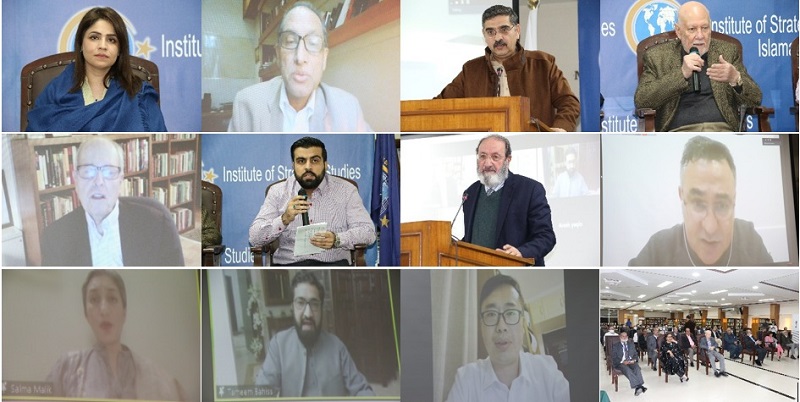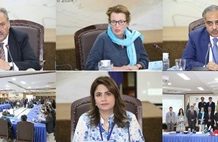PRESS RELEASE
Conversations on the Evolving Situation in Afghanistan: The Concluding Session
November 29, 2021

The Centre for Afghanistan, Middle East & Africa (CAMEA) at the Institute of Strategic Studies Islamabad (ISSI) held a Public Talk to conclude the series of conversations on “The Evolving Situation in Afghanistan” which was initiated in June 2021. The series included perspectives from Pakistan, Qatar, Middle East, US, Europe, China, Uzbekistan, Russia, Iran and Turkey.
Senator Anwaar-ul-Haq Kakar was Chief Guest at the occasion, Ambassador Ayaz Wazir was the Keynote speaker and other distinguished speakers included: Ambassador Aziz Ahmad Khan, former Ambassador of Pakistan to Afghanistan, Dr. Murat Aslan, SETA Security Researcher and Faculty Member of Hasan Kalyoncu University (Turkey), Dr. Marvin Weinbaum, Director, Afghanistan and Pakistan Studies, Middle East Institute, Mr. Hashim Pashtun, Advisor for Research Analysis to the Kabul Institute for Peace and Ambassador Khalid Mahmood Chairman BOG, ISSI. Speakers from the various conversation series also took part both physically and virtually.
During her opening remarks, Ms. Amina Khan, Director CAMEA stated that CAMEA at ISSI has been holding a series of conversations on the evolving situation in Afghanistan, since June, 2021, where the evolving situation in Afghanistan along with the role of important stakeholders has been discussed at length. The series included perspectives from Pakistan, US, China, Russia, Iran, Qatar, Iran, Turkey, Uzbekistan, Middle East and Europe.While discussing the key takeaways from the series, she said that consensus for deeper and meaningful engagement with the Taliban is necessary, which does not necessarily mean recognition, but is pertinent, in order to prevent the imminent humanitarian crises. Pakistan, being the immediate neighbor, will remain a pivotal player in Afghanistan and has an important role to play, whose policy now appears to be guided by a regional approach. Consensus, pertaining to the unfreezing of Afghanistan’s assets, and for the sanctions regime need to be reconsidered. Moreover, international donor agencies will have to play a more significant role in terms of delivering aid to the country.
During a recorded message, Ambassador Aizaz Ahmad Chaudhry, Director General ISSI, commended CAMEA for a diligent effort to understand the perspectives of different stakeholders for peace and stability in Afghanistan. He said that the conversations included perspectives from the United States, Europe, Central Asia Republics, Qatar, Turkey, Iran and perspectives from Pakistan as well. He said that every stakeholder has to play its part to stabilize the situation in Afghanistan and also highlighted that the Taliban would have to honour their commitments and fulfill the demands of the international community. Moreover, regional countries would have to step forward to stabilize the situation. The United States should remain engaged with the Taliban to find ways for peace and stability in Afghanistan. He stressed that every stakeholder is aware of the fact that instability in Afghanistan will result in chaos and civil war in the country. It is important to stay engaged with Taliban and accept that they are a political reality in Afghanistan he stated.
Senator Anwaar-ul-Haq Kakar said that Pakistan has to be more pragmatic rather than being apologetic due to its relations with the Taliban. He stated that at this stage the challenge is to tackle the situation in Afghanistan which has emerged after the irresponsible withdrawal of the US from the country.Afghanistan is a shared responsibility. Individual Afghans should not suffer. He said that everyone should understand that a stable Afghanistan is in the interest of everyone, not only Pakistan. He highlighted that if the situation in Afghanistan escalates, there will be a huge refugee influx and economic migrants will be a real point of concern for everyone including Pakistan, Iran and Europe as well. He suggested that we should start from the acceptable regime in Afghanistan if not the recognised one because we have to at least start from somewhere. Common Afghan people should not be punished and they must be given their basic rights. Peace in Afghanistan is necessary to maintain the peace in the region because instability in Afghanistan shall also spillover elsewhere.He pointed out that there are people who like and those who dislike the current arrangement and system in Afghanistan, but from what can be seen, there is no other system that can replace the current one.He further stated that there is a politics of existence in Afghanistan and Pakistan should initiate the regional process for the recognition of this regime and it is getting late because individual Afghans are suffering. At this stage we need to have an honest conversation rather than a clever conversation, he said.
Ambassador Ayaz Wazir in his remarks said that what Afghanistan needs is permanent peace and stability, not any proposals or advice. The main responsibility, he said, goes to the Taliban who have taken over the entire country. He further remarked that in the 1990s, certain regions were out of the Taliban’s jurisdiction but this time they have the entire country under them. He explained that the internal problem is that the Afghan nation is divided into two groups as earlier; one group takes over and the other fights in resistance.He further remarked that this is the opportunity for the Taliban to establish law and order in Afghanistan. He said that the Taliban have evolved and the situation is quite different this time and are not the same group that we saw earlier so the situation is not as bad, females are working but maybe not doing what the West wants them to. Regarding inclusive government, Taliban claim they are inclusive but according to the West they are still lacking..He said that the Taliban need to integrate the entire nation like it was around 40 years ago and have to be more approachable and accommodating to restore the confidence of the people who are escaping or not willing to engage with the Taliban. He also said that no government or no system of government anywhere in the world can accommodate all oppositions although the Taliban can surely make progress in terms of inclusiveness. He concluded by saying that if we fail to help the Taliban to get rid of the problems in Afghanistan, the organisations like Daesh will spread and harbor the terrorism throughout the region. So, whether we like it or not, we have to engage. Hence, we need to seriously consider recognizing the Taliban government, he said.
Ambassador Aziz Ahmad Khan said that the Taliban are here to stay so we should acknowledge this fact and proceed accordingly. He stated that since he had interacted with the Taliban in the 90s, he feels that there is a change in the behaviour of Taliban and has evolved. He said that previously their behaviour towards women was totally different but now they are allowing them to go to school and work. However, at the same time including women to the administrative positions will be difficult but women who were working previously have been asked to retain positions. He went on to say that according to the Taliban, inclusive means ethnically inclusive, not absorbing opposition. He mentioned that the Hazaras have accepted the Taliban since they know that the Taliban will accommodate them. To make the Taliban fulfill their commitment, the international community needs to interact with them because the Taliban will not accept any kind of coercion. According to him, less noise will make the Taliban easier to deal with. He went on to say that we should all let the Taliban move slowly, stay engaged to see their progress and tune our policies accordingly. He concluded by saying that at present, there is a serious food crisis and people of Afghanistan are going to suffer if not provided with timely aid.
Dr. Marvin Weinbaum said that the latest developments in Afghanistan have raised concerns for the regional as well as international community. He said that Afghanistan is drawing attention due to the massive numbers of refugees which have already crossed six hundred thousand. The numbers trying to escape Afghanistan are gaining momentum and the pressure on the Pakistan border is increasing, he said. He further said that the humanitarian crisis in Afghanistan can turn it into a tragedy and 90% of the Afghan population will be in poverty. He remarked that the humanitarian assistant might come too little and too late and that shall be a doom for regional trade. Moreover, this carries implications for the global community as well. He mentioned that destabilisation of Afghanistan will allow terrorist groups to use Afghan soil for terrorism. He said that it is a reality that the Taliban have never been pragmatic and have never shown willingness to engage and are strictly ideological which is often ignored. Dr. Marvin further said that Afghanistan is in the least integrated economic region of the world. Every neighbor of Afghanistan is concerned that the Afghan interest might go against theirs and in this regard, he said, Pakistan has greater stakes in Afghanistan as compared to any other country in the region.What is happening in Afghanistan should stay there and no country wants the problems from Afghanistan pouring into their state, he concluded.
Dr. Murat Aslan said that Afghanistan has become a key concern in the past three months. He said that there are two approaches towards Afghanistan; one is related to the concerns of the international community and other is towards the internal concerns. He said that, most countries in the west view Taliban as terrorist so they need to change their approach towards Taliban. He said that Afghanistan is important for the peace and stability of the entire region but mainly for Pakistan. While talking about the refugees he said that the immigration from Afghanistan is currently manageable. The West wants the Taliban to be tolerant. While talking about the internal concerns he said that the internal problems are much more challenging. He further mentioned how there is no human capital in Afghanistan as most of them are either hidden or have escaped. There are some groups, he said, who might reorganize themselves and later start resistance against Afghanistan. The Taliban are short of capability and money and there is a need for economic development.He concluded by saying that there is an inconsistency regarding expectations of the international community and the ground realities of Taliban. Mr. Hashim Pashtun said that Afghanistan is on the verge of one of the biggest humanitarian crises and it has to be averted as soon as possible. Additionally, the regional and global powers are expecting the current Taliban Government to respect social justice, inclusivity and to make sure that the Afghan land is not used by any terrorist group against any foriegn country. He stressed that to resolve these issues and reach a mutual consensus, such conversations are crucial. He went on to say that we have managed to have some great takeaways from these dialogues and this can help in creating an environment of mutual agreement of the key stakeholders towards a greater goal of peace and prosperity.











